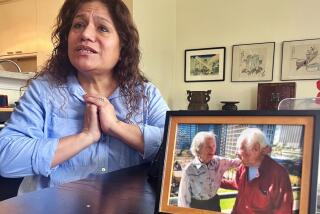Wisdom, alive and well
- Share via
Nothing distresses one of my friends more than hearing that someone has died short of their 70th birthday and Psalm 90’s promise of three score and 10 years. For Henry Alford, humorist and Thurber Prize recipient, the loss is more concrete. “If people are repositories of knowledge,” he notes, “and the death of an old person, an African saying runs, is like the burning of a library -- then I want a library card. I want borrowing privileges for the rest of my life.”
In “How to Live,” Alford seeks to capture that wisdom “before it slips off into the night” by plumbing the years beyond the biblical promise, a time the mid-40s writer hopes are ripe for “realizations and breakthroughs.” To do that, he sets out on a multi-pronged odyssey, combing through “wisdom literature,” psychosocial studies as well as interviewing those who’ve outlived the Psalms’ prophecy.
His age-appropriate cast of characters includes the famous (playwright Edward Albee, comedian Phyllis Diller, literary critic and Yale professor Harold Bloom) to the relatively unknown. Alford interviews many of them by phone but others in person, trekking from his home in New York to Maui to interview mystic Ram Dass or Houston to talk with Althea Washington, a retired New Orleans schoolteacher displaced by Hurricane Katrina.
And while Alford, true to his pedigree, draws out the humorous side of his subjects, what is revealed in “How to Live” is sometimes audacious and sometimes just odd. Theologian Martin Marty expounds on his theory that napping is a form of prayer: “My only worry,” he explains, “is that all my prayers will be answered, but I won’t know it because I’ll be asleep.”
Eugene Loh, a frugal 87-year-old retired aerospace engineer and father of comedian Sandra Tsing Loh, is noted for foraging food from grocery store Dumpsters, hitchhiking and wearing swimwear he finds at the beach.
In the midst of such frivolity, Alford’s research on wisdom studies provides much-needed grounding. Among the anchors are his interview with Setsuko Nishi, an 86-year-old sociologist who leads research on the long-term effect of wartime incarceration on Japanese Americans, or his reading about psychologist Vivian Clayton, whose early research led her to believe that while wisdom can mean many things, “it was often applied to social situations and was marked by judgment, reflection and compassion.” Such studies cause Alford to expand his definition of wisdom (which includes decisiveness, certainty and action) to include “compassion that arises from coolheadedness.”
Such revelations take on a more poignant quality when one considers Alford’s interviews with his 79-year-old mother, Ann, and 80-year-old stepfather, Will. Expecting more traditional wisdom from Will -- a retired engineer, authority on coal gasification and history buff -- Alford is surprised to learn that Will, who had become increasingly reclusive while married to Ann and has been devastated by the recent death of his first wife, has come undone, manifested by a seeming overdependence on prescription drugs.
Fed up with his apparent break from sobriety, Ann -- whose “roundabout wisdom” includes pinching the slippers provided by spas among other petty larcenies -- has asked for a divorce. The story of the marriage’s dissolution and Ann’s resolve to go on with her life yet stay connected to a man she still loves, confirms not only the judgment, reflection and compassion of Clayton’s theory but that of psychologist Robert Sternberg, who asserts, in part, that wisdom is the balancing of interpersonal and extrapersonal goals. “When you get older,” Sternberg tells Alford, “you often begin to realize that you can’t afford to say anymore, ‘In 5 or 10 years I’ll balance my life’. . . . You realize your time is valuable.”
Time spent reading “How to Live” will not be regretted by those of any age. The book succeeds both as an accessible survey of wisdom and the personal journey of a midlife man who, like many of us, is trying to see the road ahead with the assistance of the rearview mirror of those who precede him. The book’s excesses, including more aphorisms on wisdom than one could possibly absorb, and a few chapters that go astray thematically, are more than forgiven on a journey that transmits so many practical insights and -- dare I say it -- wisdom.
More to Read
Sign up for our Book Club newsletter
Get the latest news, events and more from the Los Angeles Times Book Club, and help us get L.A. reading and talking.
You may occasionally receive promotional content from the Los Angeles Times.










